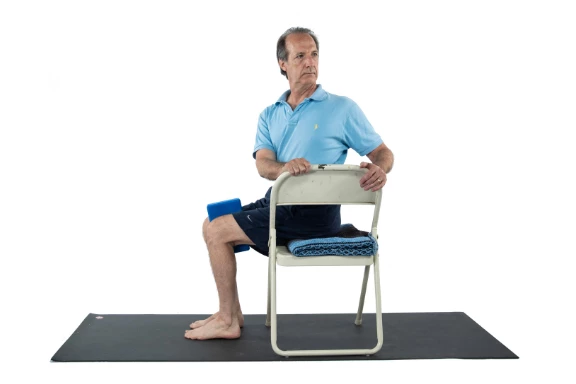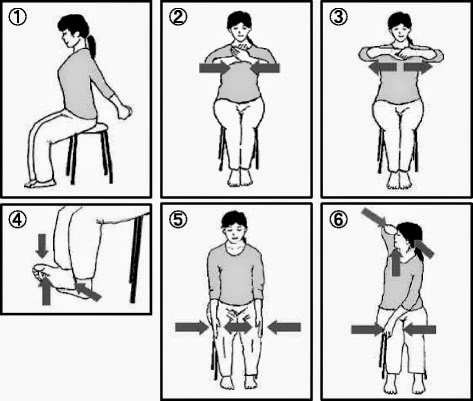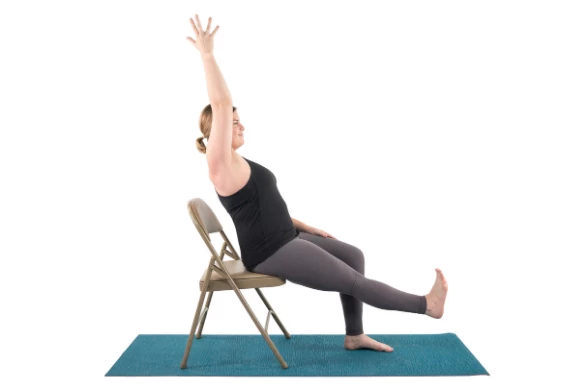Yoga Research: Study Suggests Isometric Yoga May Help Relieve Symptoms of Chronic Fatigue Syndrome

Chronic fatigue syndrome (CFS) is a medical condition characterized by persistent and ongoing fatigue, exhaustion, non-restorative sleep, and unexplained muscle and joint pain in an individual who hitherto has been a healthy, active person.
The exact cause of CFS is not understood. About one million Americans have CFS, and it occurs more often in women. While some clinicians view CFS as a central nervous system disorder, others debate over whether it is a strictly metabolic, infectious or post-infectious, cardiovascular, or psychiatric disorder.
The name “chronic fatigue syndrome” itself is so controversial that patient advocacy groups are canvassing for a name change as they feel that the term “CFS” underestimates the seriousness of the condition. Whatever the nature of the disease, however, there is a general agreement that CFS poses a genuine threat to the overall wellbeing of the individual.

What Chronic Fatigue Syndrome Looks Like
The onset of the disease is sudden and is generally accompanied by a flu-like fever. A majority of CFS cases have also been observed in patients who are chronically stressed and struck by an infection. The most common symptoms as declared by the Center for Disease Control Atlanta include:
-
Severe fatigue for more than six consecutive months that is unrelated to exertion, not relieved by rest, and has not stemmed from other known medical conditions
-
Significant reduction in activity levels due to the fatigue
-
Impaired memory
-
Failure to concentrate on a task
-
Prolonged and unexplained exhaustion and malaise
-
Poor-quality, unrefreshing or non-restorative sleep
-
Unexplained muscle pain (myalgia)
-
Unexplained joint pain in multiple areas (arthralgia)
-
Recurrent headaches, sore throat, and tender lymph nodes
-
Brain fog
-
Difficulty maintaining balance
-
Dizziness
-
Allergies and/or sensitivity to food, odors, noise, chemicals, medications
-
Digestive disturbances
-
Mood swings and panic attacks
-
Light sensitivity

Notice that many of these symptoms are also seen in other disease conditions, including lupus, multiple sclerosis (MS), Lyme disease, hypothyroidism, diabetes, and mononucleosis, among others. It is for this reason that many names have been associated with this disease in different countries, and clinicians are advised to use differential diagnosis before concluding it as CFS.
Depending on the intensity and the gamut of symptoms, patients with CFS either lead painful but relatively normal lives or are bedridden and unable to care for themselves. Owing to chronic and disabling pain, patients with CFS experience a sudden reduction in physical activity.
Since CFS affects people in many different ways, the key to living with it is treating the specific set of symptoms exhibited by the patient and starting on medications to treat the worst symptoms first. Medications include antidepressants, sleeping pills, painkillers (steroidal or non-steroidal), and narcotics. Therapeutic interventions that can help with CFS pain include acupuncture, massage, or yoga.
Study Suggests Isometric Yoga Can Help CFS Symptoms
A recent study, Isometric yoga improves the fatigue and pain of patients with chronic fatigue syndrome who are resistant to conventional therapy: a randomized, controlled trial (1) describes in detail how yoga is helpful for CFS patients. I was impressed with this study because they modified the yoga sequence to suit the patient needs.
In the study, the researchers introduced “Isometric Yoga,” which was developed by Dr. Keishin Kimura, to their patients. In this method, the asanas consist mainly of isometric muscle contractions, which patients are allowed to change depending on their fatigue level (skipping a certain pose or decreasing the number of repetitions of poses, depending on the severity of their fatigue and the pain associated with the pose). Since CFS patients experience reduced physical flexibility, isometric poses would be easy on the patients, prevent over-stretching and be painless. Most of the poses are sitting poses, and in this particular study it was a three-part program:
-
Patients were asked to be aware of their natural breathing for one minute.
-
Patients performed six isometric sitting asanas (shown in the figure below).
-
Patients practiced abdominal breathing for one minute.
Why did the authors choose this modified yoga series? First, because patients with CFS have severe fatigue, they needed to be strengthened with a suitable program that would not leave them exhausted. Second, since CFS patients experience brain fog with memory lapses, they had to be taught asanas that were simple to do and easy to remember.

(For more details on the methods and isometric asana poses illustrated above click here – Isometric yoga improves the fatigue and pain of patients with chronic fatigue syndrome who are resistant to conventional therapy: a randomized, controlled trial.) (1)
Eligible participants were randomized into two groups of 15 people to receive either an isometric yoga practice together with conventional pharmacotherapy or just conventional pharmacotherapy alone. The isometric yoga practice consisted of biweekly, 20-minute sessions with a yoga instructor and daily in-home sessions. The intervention period lasted for nearly nine weeks. All subjects completed the intervention.

The results of the nine-week program were fascinating. The fatigue score decreased significantly in the patients who did yoga. In addition to the improvement of fatigue, some patients also reported relief from pain. No serious adverse events were noted in the yoga group. Additionally, several of the yoga members reported that they felt warm and light after practicing isometric yoga. Thus, patients with CFS could benefit from isometric yoga as an add-on therapy.
Study Yoga and Healthy Aging with YogaUOnline and Lillah Schwartz – Yoga for a Healthy Spine: The #1 Key to Enhance Strength, Improve Posture, and Prevent Osteoporosis.
Reprinted with permission from Yoga for Healthy Aging.
Ram Rao, Ph.D. With a doctorate in Neuroscience, Ram presently serves as a Research Associate Professor at the Buck Institute for Research on Aging. He focuses on various aspects of age-associated neurodegenerative diseases with emphasis on Alzheimer’s disease. In addition, Ram completed the academic training at the California College of Ayurveda (CCA) and received his certification as a Clinical Ayurvedic Specialist. He has been a faculty of the California College of Ayurveda and teaches in their Nevada City location. Ram is also a dedicated Hatha yoga practitioner and is a Registered Yoga Teacher from Yoga Alliance USA. In his spare time, he offers consultations in YAMP techniques (Yoga, Ayurveda, Meditation & Pranayama). Ram has published several articles in major Yoga/Ayurveda magazines and has been a featured speaker in several national and international meetings and symposia. He is a member of the National Ayurvedic Medical Association (NAMA) and is on the Research Board of the Association of Ayurvedic Professionals of North America (AAPNA).
Sources
(1) https://bpsmedicine.biomedcentral.com/articles/10.1186/s13030-014-0027-8
BioPsychoSocial Medicine, 2014, Volume 8, Number 1, Page 1 Takakazu Oka, Tokusei Tanahashi, Takeharu Chijiwa, Battuvshin Lkhagvasuren,Nobuyuki Sudo, Kae Oka





